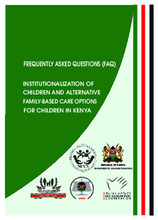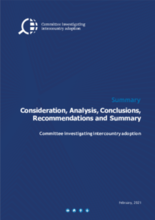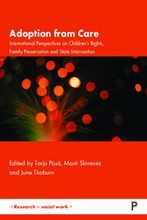Displaying 81 - 90 of 660
In this study, the authors examine the structure and function of professional social workers’ follow-up questions in assessment talk with adoption applicants.
Through interviews with adoptive parents, this study explores what and how adoption-related exploitation occurred in Ethiopia.
This booklet emphasizes the importance of family based care for the care of orphaned and vulnerable children (OVC) in Kenya, provides answers to regularly asked questions, and lists current government efforts to support OVC, including the policy and legal frameworks and existing forms of family and community-based care.
This report presents the results of an independent investigation into abuses in intercountry adoption in the Netherlands during the period 1967-1998, and the role of the Dutch government in this regard.
Based on analysis of legal documents on family reunification and educational material concerning transnational adoption in Denmark, this article suggests that the concept of attachment may be conceptualized as a specific operationalization of belonging, and that belonging and biopower may be viewed as intertwined (rather than opposites).
This seminar was given as part of the Korean Adoptee Adoption Research Network's inaugural seminar series, The Right to Know. Each speaker of the series discussed the concept of the right to origin and examined the broader social, legal and political implications in South Korea as a sending country along with experiences from North America and Europe as receiving countries.
This article presents evidence of son preference in the child trafficking market for illegal adoption in China, where son preference is explicitly revealed by choice and quantified by the price premium of a boy.
The current study used a randomized controlled trial to assess whether Attachment and Biobehavioral Catch-Up (ABC) improved the diurnal functioning of the hypothalamic–pituitary–adrenal (HPA) axis among 85 children who had been adopted internationally when they were between the ages of 4 and 33 months
This book introduces general topics on human rights and attachment, as well as a country-specific in-depth analysis of the legal and policy imperatives guiding adoptions from care, with a particular interest on the rights of children and their care-taking adults, including their birth parents
This study sought to validate the Early TRAuma-related Disorders Questionnaire (ETRADQ), a caregiver report which was developed to assess attachment disorders in school-age children based on the Diagnostic and Statistical Manual of Mental Disorders–Fifth edition criteria.



